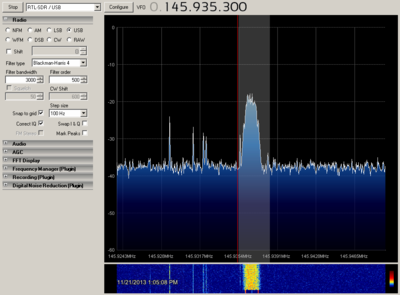RevRadio: Difference between revisions
m HTTPS! |
No edit summary |
||
| Line 4: | Line 4: | ||
|Contact=User:Bertrik_Sikken | |Contact=User:Bertrik_Sikken | ||
}} | }} | ||
== News == | |||
2014-02-15: Installed our [http://lna4all.blogspot.nl/ LNA4ALL] amplifier on the discone antenna, should give a slightly better signal-noise ratio and allow us to split the radio signal out to several receivers so we can capture several kinds of signals at once (e.g. ADSB, AIS and APRS). | |||
== Introduction == | == Introduction == | ||
| Line 12: | Line 15: | ||
== Hardware == | == Hardware == | ||
=== HF (0 - 30 MHz) === | === HF and below (0 - 30 MHz) === | ||
To receive signals from the relatively low frequency "HF" band, we have a [http://www.nooelec.com/store/ham-it-up-v1-0-rf-upconverter-for-software-defined-radio.html ham-it-up] board. | To receive signals from the relatively low frequency "HF" band, we have a [http://www.nooelec.com/store/ham-it-up-v1-0-rf-upconverter-for-software-defined-radio.html ham-it-up] board. | ||
The ham-it-up converts signals from 0-30 MHz up to 125-155 MHz, this makes is possible to use an RTL2832-based dongle to receive them. | The ham-it-up converts signals from 0-30 MHz up to 125-155 MHz, this makes is possible to use an RTL2832-based dongle to receive them. | ||
Revision as of 11:28, 22 February 2014
| Project RevRadio | |
|---|---|
| Status | In progress |
| Contact | User:Bertrik_Sikken |
| Last Update | 2014-02-22 |
News
2014-02-15: Installed our LNA4ALL amplifier on the discone antenna, should give a slightly better signal-noise ratio and allow us to split the radio signal out to several receivers so we can capture several kinds of signals at once (e.g. ADSB, AIS and APRS).
Introduction
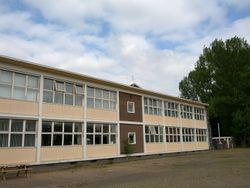
This project consists of several small sub-projects related to radio reception at RevSpace. Reception is based (so far) on DVB-T dongles using an RTL2832 chip to do SDR (software-defined-radio).
Hardware
HF and below (0 - 30 MHz)
To receive signals from the relatively low frequency "HF" band, we have a ham-it-up board. The ham-it-up converts signals from 0-30 MHz up to 125-155 MHz, this makes is possible to use an RTL2832-based dongle to receive them.
Things that can be received with this setup:
- morse and rtty beacons;
- amateur radio voice;
- amateur radio SSTV (slow-scan TV);
- number stations such as the buzzer;
- commercial AM broadcasts
- etc.
Stuff we can implement
- Put it in a box!
- Experiment with different (home made) antennas such as the mini whip
- Hooking it up to our main SDR computer. Requires antenna on the roof
Generic VHF/UHF (24 - 1700 MHz)
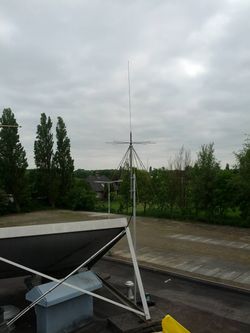
For generic radio reception in the VHF/UHF bands, we have a setup consisting of a discone antenna (ICOM AH-7000) on the roof of RevSpace and an RTL2832 dongle (R820T tuner). A simple filter (1/4 wave open stub) has been built to suppress very strong pager signals.
Things that can be received with this setup:
- Citizens Band radio, 27 MHz
- 10 meter amateur band, 28-29.7 MHz
- 4 meter amateur band, 70-70.5 MHz
- broadcast FM stereo, 88-108 MHz;
- air traffic (voice);
- P2000 paging traffic at 169.650 MHz;
- weather images from the NOAA-15/18/19 weather satellites, at around 137 MHz;
- APRS traffic;
- weather info from weather balloons, at 400-410 MHz;
- ads-b/mode-s airplane transponders, at 1090 MHz
- etc.
Todo:
- Get rid of the massive broadcast FM band, it's worth the trade between doing FM DX and broadcast FM noise.
HAB tracker (434-435 MHz)
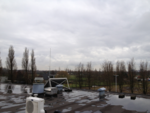
For tracking high-altitude balloons, we have a setup consisting of a collinear antenna for 70cm on the roof of RevSpace, a so-called hab-amp (bandpass filter for 430-440 MHz and low noise amplifier) and an RTL2832 dongle (FC0013 tuner). For more information, see the dedicated page at HAB_Tracker_Station
Things that can be received with this setup:
- The complete 70 cm amateur band, 430-440 MHz
- 70 cm ISM band, ~434 Mhz
- high-altitude balloons, see spacenear tracker
Software
Currently one PC is dedicated to radio reception, called "habtracker". To start the PC:
- Windows XP, hostname "habtracker", IP 10.42.44.94 (MAC 00:21:70:02:62:0f)
- Start the machine with a magic WoL packet: 'wakeonlan -i 10.42.255.255 00:21:70:02:62:0f; ping habtracker'
Remote control
The PC can be remotely controlled as follows:
- Teamviewer, ID: 675540724
- VNC: geheim ;-)
Running projects
AIS decoding
- COAA's shipplotter to APRS.fi
- Our APRS.fi page
- Heatmap of received ships
Amateur satellite reception
In this project, we try to receive amateur satellites and process data like telemetry. There are several amateur satellites in orbit right now, some of which transmit in frequency range of our HAB setup. Signals outside of the 70cm band can only be received with the discone antenna. This antenna might not be the best for picking up weak signals. However, since we have line of sight as soon as it's a few degrees above the horizon it should still produce some interesting results.
We have already managed to receive (but not decode yet) signals from the STRaND-1 and HOPE-1 (HO-68) satellites.
In the future, we plan to receive and decode telemetry from the existing Delfi-C3 and its successor Delfi-n3xt (launched in November 2013).
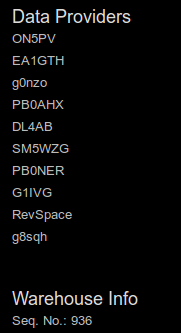
Delfi-n3xt has heard, but not yet decoded. Instead we have been focusing on the FUNcube-1 cubesat. As of editing this page (25 hours since launch) we received 113 packets. You can see up-to-date receiver statistics here. The FUNcube warehouse is the central database where radio enthusiasts all over the world can submit their decoded telemetry data to, so the FUNcube team always knows whats going on.
Longer term plans
Stuff we are still planning to do:
- think about an antenna for HF: random piece of wire would be a nice starter
- setup ham-it-up for 24/7 listening
